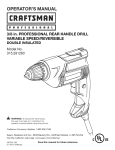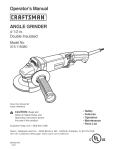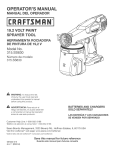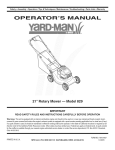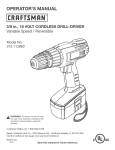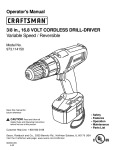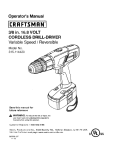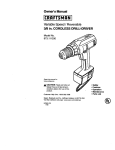Download Craftsman 315.114480 Operator`s manual
Transcript
in,, 19,2 Speed / Model No. 315.114480 Save this manual future reference for • • • . . WARNING" To reduce the risk of injury, the user must read and understand the operator's manual before using this product. Customer HeUp Line: 1-800-932-3188 Sears, Roebuck and Co., 3333 Bevedy Rd., Hoffman Visit the Craftsman web page www.sears.com/craftsman 983000-194 11-03 Safety Features Operation Maintenance Parts List Estates, RL 60179 USA US m General Safety Rubs ................................................................................................................................................. 3-4 m Specific Safety Rubs ................................................................................................................................................. 4-5 m SymboB .......................................................................................................................................................................... 6 m Product Specifications .................................................................................................................................................... 7 m Features ..................................................................................................................................................................... 7-8 m Operation .................................................................................................................................................................. 9-14 m Maintenance ................................................................................................................................................................. 15 m Exploded View And Repair Parts List .......................................................................................................................... 17 m Parts Ordering / Service ............................................................................................................................................... 18 FULL ONE YEAR WARRANTY ON CRAFTSMAN 1/2 in. CORDLESS DRILL-DRIVER If this _:RRFT_:MRN1/2 in. Cordless Drill-Driver fails to give complete satisfaction within one year from the date of purchase, RETURN iT TO THE NEAREST SEARS STORE OR SEARS SERVICE CENTER iN THE UNITED STATES, and Sears wiiI repair it, free of charge. If this I:RRF'r$1qRN 1/2 in. Cordbss DriiPDriver is used for commercial 90 days from the date of purchase. or rental purposes, this warranty applies for only This warranty gives you specific legal rights, and you may also have other rights which vary from state to state. Sears, Roebuck and Co., Dept. 8t7WA, Hoffman Estates, Your cordless drill-driver has many features for making the use of this product more pleasant and enjoyable. Safety, performance, and dependability have been given top priority in the design of this product making it easy to maintain and operate. Look for this symbol to point Your safety is involved. out important tL 60179 ,_ safety WARNING: Do not attempt to use this product until you read thoroughly and understand completely the operator's manual Pay close attention to the safety rubs, including Dangers, Warnings, and Cautions. If you use this product properly and only as intended, you will enjoy years of safe, reliable service. precautions, it means attention!!! WARNING: The operation of any power tool can result in foreign objects being thrown into your eyes, which can result in severe eye damage. Before beginning power tool operation, always wear safety goggles or safety glasses with side shields and a full face shield when needed. We recommend Wide Vision Safety Mask for use over eyeglasses or standard safety glasses with side shields. Always use eye protection which is marked to comply with ANSI Z87.1. _ WARNmNG: ReadandunderstandaHinstructions. FailuretofollowaHinstructions Hstedbebw, mayresuUt in eUectric shock,fireand/orserious personaU injury. SAVETHESEmNSTRUCTIONS WORKAREA m Keepyourwork areacJeanandwell Jit.CUuttered benchesanddarkareasinviteaccidents. m Donot operatepowertooJsin expJosiveatmospheres,suchas in the presenceof flammable liquids,gases,or dust. PowertooBcreatesparks whichmayignitethedustor fumes. m Keepbystanders,children,andvisitorsawaywhile operatinga powertool. Distractions carlcauseyou tolosecontrol. ELECTRmCAL SAFETY m Donot abusethe cord.Neverusethe cord to carry thecharger.Keepcord awayfromheat,oH,sharp edges,or movingparts.RepJace damagedcords immediately.Damaged cordsmaycreatea fire. m A batteryoperatedtool with integralbatteriesor a separatebatterypackmustbe rechargedonly with the specified charger for the battery. A charger that may be suitable for one type of battery may create a risk of fire when used with another battery. Use battery MODEL 315.114480 BATTERY PACK CHARGER item No. 9 11375 Item No. 9 11041 1323517 or 1323903 1425301 m Use battery operated tooJ only with specifically designated battery pack. Use of any other batteries may create a risk of fire. Use only with battery pack listed. PERSONAL SAFETY m Stay aJert, watch what you are doing and use common sense when operating a power tool Do not use tooJ while tired or under the influence of drugs, alcohol, or medication. A moment of inattention while operating power tools may result in serious personal injury. m Dress properly. Do not wear loose clothing or jewelry. Contain long hair. Keep your hair, clothing, and gtoves away from moving parts. Loose clothes, jewelry, or long hair can be caught in moving parts. m Avoid accidentaJ starting. Be sure switch is in the locked or off position before inserting battery pack. Carrying tools with your finger on the switch or inserting the battery pack into a tool with the switch on, invites accidents. m Remove adjusting keys or wrenches before turning the tool on. A wrench or a key that is left attached to a rotating part of the tool may result in personal injury. m Do not overreach. Keep proper footing and balance at aH times. Proper footing and balance enable better control of the tool in unexpected situations. Do not use on a ladder or unstable support. m Use safety equipment. Always wear eye protection. Dust mask, nonskid safety shoes, hard hat, or hearing protection must be used for appropriate conditions. TOOL USE AND CARE m Use clamps or other practical way to secure and support the workpiece to a stabte pJatform. Holding the work by hand or against your body is unstabb and may lead to loss of controk m Do not force tool Use the correct tooJ for your appJication. The correct tool will do the job better and safer at the rate for which it is designed. m Do not use tooJ if switch does not turn it on or off. A tool that cannot be controlbd with the switch is dangerous and must be repaired. m Disconnect battery pack from tool or place the switch in the locked or off position before making any adjustments, changing accessories, or storing the tool. Such preventive safety measures reduce risk of starting the tool accidentally. m Store idle tools out of reach of children and other untrained persons. Tools are dangerous in the hands of untrained users. m When battery pack is not in use, keep it away from other metaJ objects like: paper clips, coins, keys, naris, screws, or other small metaJ objects that can make a connection from one terminal to another. Shorting the battery terminaB together may cause sparks, burns, or a fire. m Maintain tools with care. Keep cutting tools sharp and dean. Properly maintained tools, with sharp cutting edges are less likely to bind and are easier to control. m Check for misaJignment or binding of moving parts, breakage of parts, and any other condition that may affect the tool's operation, ff damaged, have the tool serviced before using. Marly accidents are caused by poorly maintained tools. m Use onJy accessories that are recommended by the manufacturer for your model Accessories that may be suitable for one tool, may create a risk of injury when used on another tool. m Keep the tool and its handle dry, clean and free from oil and grease. Always use a clean cloth when cleaning. Never use brake fluids, gasoline, petrobumbased products, or any strong solvents to clean your tool. SERVICE m Toolservicemustbeperformedonly by qualified repairpersonnel.Serviceor maintenance performed byunqualified personneU couUd resuUt ina riskof injury. m Whenservicinga tool, useonly identicaJrepJacemeritparts.Followinstructionsin the Maintenance sectionof this manual.Useofunauthorized partsor failuretofoUUow Maintenance Rnstructions maycreatea riskofshockor injury. HoJdtool by insulatedgripping surfaces when performing an operation where the cutting tool may contact hidden wiring. Contact with a "live" wire will make exposed metal parts of the tool "live" and shock the operator. ABBmTIONAL RULES FOR SAFE OPERATmON m Know your power tool Read operator's manuat carefully. Learn its applications and Jimitations, as well as the specific potential hazards retated to this tool Following this rule will reduce the risk of electric shock, fire, or serious injury. m Always wear safety glasses with side shields. Everyday glasses have only impact resistant lenses. They are NOT safety glasses. H'_PORTANT m m RULES FOR BATTERY ,_ m Do not charge battery tool in a damp or wet location. Following this rule will reduce the risk of electric shock. m For best results, your battery tool shouJd be charged in a Jocation where the temperature is more than 50°F but less than IO0°F. Do not store outside or in vehicles. m Under extreme usage or temperature conditions, battery leakage may occur, ff liquid comes in contact with your skin, wash immediately with soap and water, then neutraJize with Jemon juice or vinegar, ff liquid gets into your eyes, flush them with cJean water for at least 10 minutes, then seek immediate medical attention. Following this rule will reduce the risk of serious personal injury. TOOLS Battery tools do not have to be plugged into an eJeetricaJ outlet; therefore, they are aJways in operating condition. Be aware of possible hazards when not using your battery tool or when changing accessories. Following this rule will reduce the risk of electric shock, fire, or serious personal injury. Do not pJace battery toots or their batteries near fire or heat. This will reduce the risk of explosion and possibly injury. WARMNG: Batteries vent hydrogen gas and can explode in the presence of a source of ignition, such as a pilot light. To reduce the risk of serious personal injury, never use any cordless product in the presence of open flame. An exploded battery can propel debris and chemicals. If exposed, flush with water m Do not operate charger with a damaged cord or pJug. if damaged, have repJaced immediately by a qualified serviceman. Following this rule will reduce the risk of electric shock, fire, or serious personal injury. m Do not operate charger if it has received a sharp blow, been dropped, or otherwise damaged in any way; take it to a quaJified serviceman. Following this rule will reduce the risk of electric shock, fire, or serious personal injury. m Do not disassemble charger; take it to a qualified serviceman when service or repair is required. Incorrect reassembly may resuJt in a risk of eJec= tric shock or fire. Following this rule will reduce the risk of electric shock, fire, or serious personal injury. m To reduce the risk of electric shock, unplug charger from outJet before attempting any maintenance or cleaning. Turning off controls will not reduce this risk. Following this rule will reduce the risk of electric shock, fire, or serious personal injury. m Disconnect charger from power supply when not in use. Following this rule will reduce the risk of electric shock, fire, or serious personal injury. n Save these instructions. Refer to them frequently and use them to instruct others who may use this tool tf you loan someone this tool, loan them these instructions also. Following this rule will reduce the risk of electric shock, fire, or serious personal injury. batteryis subjecttoexpbsion.ProperUy disposeof a droppedbatteryimmediateUy. Failuretoheedthis warningcanresultinseriouspersonalinjury. m Beforeusing batterycharger,readaHinstructions andcautionarymarkingsin this manual,on batterycharger,andproductusingbattery charger.Followingthisrub wHU reducetheriskof eUectric shock,fire,or seriouspersonaU injury. m To reducerisk of injury,chargeonly nickeJ= cadmiumandnickelmetalhydridetype recharge° abJebatteries.Othertypesof batteriesmayburst causingpersonalinjuryanddamage.Followingthis rub willreducetheriskofelectricshock,fire,or seriouspersonalinjury. m Donot exposechargerto wetor damp conditions. Following this rule will reduce the risk of electric shock, fire, or serious personal injury. m m m Use of an attachment not recommended or sold by the battery charger manufacturer may resuJt in a risk of fire, etectric shock, or injury to persons. Following this rule will reduce the risk of electric shock, fire, or serious personal injury. To reduce risk of damage to charger body and cord, pull by charger plug rather than cord when disconnecting charger. Following this rule will reduce the risk of electric shock, fire, or serious personal injury. Make sure cord is located so that it will not be stepped on, tripped over, or otherwise subjected to damage or stress. Following this rule will reduce the risk of serious personal injury. m m Do not abuse cord. Never carry tooJ by cord or yank it to disconnect from receptacle. Keep cord from heat, oH and sharp edges. Following this rule will reduce the risk of electric shock or fire. An extension cord should not be used unless absolutely necessary. Use of improper extension cord could result in a risk of fire and electric shock. If extension cord must be used, make sure: a. That pins on plug of extension cord are the same number, size and shape as those of plug on charger. b. That extension cord is properly wired and in good electrical condition; and c. That wire size is large enough for AC ampere rating of charger as specified below: Cord Length (Feet) 25' 50' 100' Cord Size (AWG) 16 16 16 Note: AWG = American Wire Gage WARNING: Some dust created by power sanding, sawing, grinding, drilling, and other construction activities contains chemicals known to cause cancer, birth defects or other reproductive harm. Some examples of these chemicals are: o lead from bad-based paints, o crystalline silica from bricks and cement and other masonry products, and o arsenic and chromium from chemically-treated lumber. Your risk from these exposures varies, depending on how often you do this type of work. To reduce your exposure to these chemicals: work in a well ventilated area, and work with approved safety equipment, such as those dust masks that are specially designed to filter out microscopic particles. important:Someofthefollowingsymbolsmaybeusedonyourtool.Pleasestudythemandbarntheirmeaning.Proper interpretation ofthesesymbolswiiiallowyouto operatethetoolbetterandsafer. SYMBOL NAME DESiGNATION/EXPLANATION V Volts Voltage A Amperes Current Hz Hertz Frequency (cyclespersecond) rain Minutes Time "_ AlternatingCurrent Typeor a characteristic ofcurrent DirectCurrent Typeor a characteristic ofcurrent no NoLoadSpeed Rotational speed,at noload .../rain Revolutions or Reciprocation PerMinute Revolutions, strokes, surfacespeed,orbitsetc.perminute SafetyAlertSymbol Undicates danger,warningorcaution. Utmeansattention!!! Yoursafetyis involved. WearEyeProtection Alwayswearsafetygogglesor safetyglasseswithsideshieldswhen operatingthisproduct. WetConditions Alert locations. Donotexposetorainoruseindamp Thepurposeof safetysymbolsisto attractyourattentiontopossibledangers.Thesafetysymbols,andthe explanations withthem,deserveyourcarefulattentionandunderstanding. Thesafetywarningsdonotbythemselves eliminateanydanger.Theinstructions or warningstheygivearenotsubstitutes forproperaccidentprevention measures. Symbol Meaning DANGER:hdicatesan imminently hazardous situationwhich,if notavoided,wiiiresultindeathor seriousinjury. WARNmNG:Indicates a potentially hazardous situationwhich,if notavoided,couldresultin deathor seriousinjury. CAUTION:Indicates a potentially hazardous situationwhich,if notavoided,mayresultin minoror moderateinjury.It mayalsobeusedtoalertagainstunsafepracticesthatmaycausepropertydamage. NOTE: Advisesyouofinformation or instructions vitaltotheoperationormaintenance oftheequipment. SAVE THESE INSTRUCTIONS 6 } I Craftsman114480=19,2Vtest criteria 400 in.lb,torque 320 #8x 1.25-in.woodscrewsinlowspeedperbatterypackchargeintopinelumber. ,, 210 3/8-in.diameterhobsperbatterypackchargeinto2-in.nominalpinelumber. KNOW YOUR DRILL-DRIVER See Figure 1, Before attempting to use your drill-driver, familiarize yourself with all operating features and safety TWO SPEED GEAR TRAIN Your drill-driver has a two speed gear train designed for drilling or driving at H_or LO speeds. A slide switch is located on top of your drill to select either HI or LO speed. FORWARD/REVERSE _ WARNmNG: Do not allow familiarity with your drilldriver to make you careless. Remember that a careless fraction of a second is sufficient to inflict severe injury. KEYLESS CHUCK (DIRECTION SELECTOR OF ROTATION SELECTOR} Your drill-driver has a forward/reverse selector located above the switch trigger. WRIST STRAP Your drHPdrNer has a keybss chuck that allows you to hand tighten or rebase drHUbit in the chuck jaws, A wrist strap is provided to reduce the chances of dropping your drill-driver. Place one hand through the wrist strap when carrying tool SWITCH BIT STORAGE To turn your drill-driver ON, depress the switch trigger. When not in use, bits provided with your drill-driver can be placed in the storage area located on the bottom of the motor housing. Release switch trigger to turn your drill-driver OFF. SWITCH LOCK The switch trigger can be locked in the OFF position. This feature helps reduce the possibility of accidental starting when not in use. VARIABLE SPEED This tool has a variable speed switch that delivers higher speed with increased trigger pressure. Speed is controlled by the amount of switch trigger depression. LEVEL To keep drill bit level during drilling operations, a level is located on the top and end of the motor housing. _ WARNING: If any parts are missing, do not operate your drill-driver until the missing parts are replaced. Failure to do so could result in possible serious personal injury. LEVEL TWO-SPEED GEARTRAIN(H-LO) KEYLESS CHUCK REAR VIEW DIRECTION OF ROTATION SELECTOR (FORWARD/REVERSE) SWITCH TRIGGER SCREWDRIVER BITS BIT STORAGE WRIST STRAF BATTERY PACK SHOWN INCHARGER CHARGER RED LEDONiNDICATES FAST CHARGING MODE GREEN LEDONAFTER FAST CHARGING CYCLE, INDICATES FULLY CHARGED BATTERY PACK ANDINTRICKLE CHARGE MODE. YELLOW ANDGREEN LEDS ONINDICATES DEEPLY DISCHARGED ORDEFECTIVE BATTERY PACK. CHARGER SeeFigure1, Yourchargerhasa "keyhoHe" hangingfeatureforconvenient, spacesavingstorage,ScrewsshouHd beinstaHHed so that centerdistancesare4-1/2inchesapart, 8 ,_ WARNING: Do not allow familiarity with your drilldriver to make you careless. Remember that a careless fraction of a second is sufficient to inflict severe injury. BATTERY PACK The battery pack for your tool has been shipped in a low charge condition to prevent possible problems. Therefore, you should charge it until light on front of charger changes from red to green. Note: Batteries wiii not reach fuji charge the first time they are charged. Allow several cycles (drilling followed by recharging) for them to become fully charged. CHARGING BATTERY PACK See Figure 1. m Charge battery pack only with the charger provided. m Make sure power supply is normal household voJtage, 120 volts, 60 Hz, AC only. m Connect charger to power supply. m Place battery pack in charger aligning raised rib on battery pack with groove in charger. See Figure 1. m Press down on battery pack to be sure contacts on battery pack engage properly with contacts in charger. m Normally, the red LED on charger will come on. This indicates charger is in fast charging mode. m Red LED should remain on for approximately 1 hour then the green LED will come on. Green LED on indicates battery pack is fully charged and charger is in trickle charge mode. Note: Green LED will remain on until battery pack is removed from charger or charger is disconnected from power supply. m Ufboth yellow and green LED come on, this indicates a deeply discharged or defective battery pack. Allow battery pack to remain in charger for 15 to 30 minutes. When battery pack reaches normal voltage range, red LED should come on. Ufred LED does not come on after 30 minutes, this indicates a defective battery pack and should be replaced. m After normal usage, a minimum of 1 hour of charging time is required to fully recharge battery pack. m The battery pack will become slightly warm to the touch while charging. This is normal and does not indicate a problem. m Do not place charger and battery pack in an area of extreme heat or cold. It will work best at normal room Note: Charger and battery pack should be placed in a location where the temperature is more than 50°F bust less than 100°F. m When batteries become fully charged, unplug charger from power supply and remove the battery pack. LED FUNCTIONS OF CHARGER LED WILL BE ON TO INDICATE CHARGER AND BATTERY STATUS OF PACK: m Red LED on = Fast charging mode. m Green LED on = Fully charged and in trickle charge mode. m Green LED on = When battery pack is inserted into charger, indicates hot battery pack or that battery pack is out of or below normal temperature range. m Yellow and Green LEDs on = Deeply discharged or defective battery pack. m No LED on = Defective charger or battery pack. _ CAUTION: To prevent damage to battery pack, remove battery pack from charger immediately if no LED comes on. Return battery pack and charger to your nearest Sears Service Center for checking or replacing. Also, if you are removing battery pack from charger and no LEDs are on, return both battery pack and charger to your nearest Sears Service Center. Do not insert another battery pack into charger. A damaged charger may damage a battery pack. mMPORTANT HOT BATTERY iNFORMATiON FOR RECHARGING PACK When using your drill-driver continuously, the batteries in your battery pack will become hot. You should let a hot battery pack cool down for approximately 30 minutes before attempting to recharge. When the battery pack becomes discharged and is hot, this will cause the green LED to come on instead of the red LED. After 30 minutes, reinsert battery pack in charger. Ufgreen LED continues to remain on, return battery pack to your nearest Sears Repair Center for checking or replacing. Note: This situation only occurs when continuous use of your drill causes the batteries to become hot. Utdoes not occur under normal circumstances. Refer to "CHARGING BATTERY PACK" for normal recharging of batteries. If the charger does not charge your battery pack under normal circumstances, return both the battery pack and charger to your nearest Sears Repair Center for electrical check. mMPORTANT iNFORMATION COOL BATTERY PACK FOR RECHARGING Ufbattery pack is below normal temperature range, the green LED on charger wiii come on. Allow battery pack to reach normal temperature, then the red LED will come on. Note: Refer to "CHARGING BATTERY PACK" for normal recharging of batteries. If the charger does not charge your battery pack under normal circumstances, return both the battery pack and charger to your nearest Sears Repair Center for electrical check. SWmTCH SeeFigure2, ToturnyourdrillON,depresstheswitchtrigger.Toturnit OFF,releasetheswitchtrigger. FORWARD/REVERSE SWITCHTRIGGER VARmABLE TO mNSTALL BATTERY PACK m Lock switch trigger on your drill by placing the direction of rotation selector in center position. See Figure 5, m Place battery pack in your drilk Align raised rib on battery pack with groove inside drill. See Figure 4, ._ BATTERY PACK Fig. 2 SPEED LATCHES This tool has a variable speed switch that delivers higher speed and torque with increased trigger pressure. Speed is controlled by the amount of switch trigger depression. Note: You might hear a whistling or ringing noise from the switch during use. Do not be concerned, this is a normal part of the switch function. TWO-SPEED ,,,,, GEAR TRAIN See Figure 3, Your drill has a two-speed gear train designed for drilling or driving at LO (1) or H_(2) speeds. A slide switch is located on top of your drill to select either LO (1) or NJ (2) speed. When using drill in the LO (1) speed range, speed will decrease and unit will have more power and torque. When using drill in the HI (2) speed range, speed wiii increase and unit will have less power and torque. Use LO (1) speed for high power and torque applications and H_ (2) speed for fast drilling or driving applications. TWOSPEED GEARTRAIN(H-LO) DEPRESS RELEASEBATTERYPACK Fig. 4 m Make sure the latches on each side of your battery pack snap in place and battery pack is secured in drill before beginning operation. ,_ LO SPEED CAUTION: When placing battery pack in your drill, be sure raised rib on battery pack aligns with groove inside drill and latches snap into place properly. Umproper assembly of battery pack can cause damage to internal components. TO REMOVE BATTERY PACK m Lock switch trigger on your drill by placing the direction of rotation selector in center position. See Figure 5, Hm SPEED m Locate latches on side of battery pack and depress to release battery pack from your drill. See Figure 4, m Remove battery pack from your drilk Fig. 3 10 SWITCHLOCK KEYLESS See Figure 5, See Figure 6, The switch trigger can be bcked in the OFF position. This feature can be used to prevent the possibility of accidentaU starting when not in use. To bck switch trigger, pUace the direction of rotation sebctor (Forward/Reverse Sebctor) in center position. Note: When sebctor is in center position, switch trigger is bcked. Your drHUhas a keybss chuck. As the name implies, you can hand tighten or rebase drHUbits in the chuck jaws. Grasp and hoUdthe collar of the chuck with one hand. Rotate the chuck body with your other hand. The arrows on the chuck indicate which direction to rotate the chuck body in order to LOCK (tighten) or UNLOCK (release) the drill bit. SELECTORWiTH CENTERLOCK POSITION REVERSE DRILL BIT SWITCH TRIGGER LOCK (TIGHTEN) Fig, 5 CHUCK COLLAR CHUCK BODY Fig. 6 WARNING: Battery tools are always in operating condition. Therefore, switch should always be locked when not in use or carrying at your side. _ REVERSIBLE See Figure 5, This tool has the feature of being reversible. The direction of rotation is controlled by a selector located above the switch trigger. With the drill held in normal operating position, the direction of rotation selector should be positioned to the left of the switch for drilling. The drilling direction is reversed when the selector is to the right of the switch. When the selector is in center position, the switch trigger is locked. ,_ UNLOCK (RELEASE) CNUCKJAWS FORWARD _ CHUCK CAUTION: To prevent gear damage, always allow chuck to come to a complete stop before changing the direction of rotation. To stop, release switch trigger and allow the chuck to come to a complete stop. 11 WARNmNG: Do not hold chuck body with one hand and use power of the drill to tighten chuck jaws on drill bit. Chuck body could slip in your hand or your hand could slip and come in contact with rotating drill bit. This could cause an accident resulting in serious personal injury. mNSTALUNGBraTS SeeFigure7, m LocktheswitchtriggerbypUacing thedirectionof rotationsebctorincenterposition.SeeFigure5, m Openor closechuckjawstoa pointwheretheopeningis slightlyUarger thanthebit sizeyouintendtouse. ADo,raisethefrontofyourdrHU slightlytokeepthebit fromfallingoutofthechuckjaws. m Unsert drHU bitstraightintochuckthefullbngthofthe jawsasshownin Figure7. m TightenthechuckjawsondrHU bit. UNLOCK (RELEASE) REMOWNG BraTS See Figure 7, m Lock the switch trigger by placing the direction of rotation selector in center position. See Figure 5, m Loosen the chuckjaws m To loosen: grasp and hold the collar of the chuck with one hand, while rotating chuck body with your other hand. Note: Rotate chuck body in the direction of the arrow marked UNLOCK to loosen chuck jaws. Do not use a wrench to tighten or loosen the chuck jaws. m [:] CHUCK COLLAR from drill bit, Remove drill bit from chuck jaws. ADJUSTABLE TORQUE CLUTCH Your drill is equipped with an adjustable torque clutch for driving different types of screws into different materials. The proper setting depends on the type of material and the size of screw you are using. TO ADJUST CHUCK JAWS LOCK CHUCK (TIGHTEN) BODY RIGHT m m ,_ m Identify the twenty four torque indicator settings located on the front of your drill. See Figure 9, m Rotate adjusting ring to the desired setting. o 1-4 For driving small screws. o 5-8 For driving screws into soft material. o 9 - 12 For driving screws into soft and hard materials. o 13 - 16 For driving screws in hard wood. o 17 - 20 For driving large screws. Fig. 7 To tighten the chuck jaws on drill bit; grasp and hold the collar of the chuck with one hand, while rotating the chuck body with your other hand. TORQUE o 21 - t,_,1 For heavy drilling. Note: Rotate the chuck body in the direction of the arrow marked LOCK to tighten chuck jaws. Do not use a wrench to tighten or loosen the chuck jaws. TO DECREASE TORQUE WARNING: Make sure to insert drill bit straight into chuck jaws. Do not insert drill bit into chuck jaws at an angle then tighten, as shown in Figure 8. This could cause drill bit to be thrown from drill, resulting in possible serious personal injury or damage to the chuck. Fig. 9 12 BIT STORAGE DRILLING See Figure 10, See Figure 12, When not in use, bits provided with your drill can be placed in the storage area located on the bottom of your drill as shown in Figure 10. LEVEL BIT STORAGEAREA _ Fig. 10 WARNING: Always wear safety goggles or safety glasses with side shields when operating tools. Failure to do so could result in objects being thrown into your eyes, resulting in possible serious injury. Fig. 12 LEVEL See Figure 11, When drilling hard smooth surfaces use a center punch to mark desired hob location. This wiii prevent the drill bit from slipping off center as the hob is started. However, the low speed feature allows starting hobs without center punching if desired. To accomplish this, simply operate your drill at a low speed until the hob is started. The material to be drilled should be secured in a vise or A convenient feature provided with your drill is a level Ut is recessed in the motor housing on top and end of your drill It can be used to keep drill bit level during drilling operations. with clamps to keep it from turning as the drill bit rotates. Hold tool firmly and place the bit at the point to be drilled. Depress the switch trigger to start tool Move the drill bit into the workpiece applying only enough pressure to keep the bit cutting. Do not force or apply side pressure to elongate a hob. _ WARNmNG: Be prepared for binding or bit breakthrough. When these situations occur, drill has a tendency to grab and kick opposite to the direction of rotation and could cause loss of control when breaking through material. If not prepared, this loss of control can result in possible serious injury. When drilling metals, use a light oil on the drill bit to keep it from overheating. The oil wiii prolong the life of the bit and increase the drilling action. Ufthe bit jams in workpiece or if the drill stalls, release switch trigger immediately. Remove the bit from the workpiece and determine the reason for jamming. Fig. 11 18 CHUCKREMOVAL SeeFigures13,14,and15, Thechuckmustberemovedin orderto usesome accessories. Toremove: m Locktheswitchtriggerby placingthedirectionof rotationselectorin centerposition.SeeFigure5, m Unsert a 5/16in.orlargerhexkeyintothechuckofyour drillandtightenthechuckjawssecurely. m Tapthehexkeysharplywitha malletin a clockwise direction.SeeFigure13,Thiswillloosenthescrewin thechuckforeasyremoval. Inserthexkeyinchuckandtightenchuckjaws securely.Tapsharplywitha malletin a counterclockwisedirection.Thiswillloosenchuckonthespindle.It cannowbeunscrewed byhand.SeeFigure15, [_IALLET MALLET CHUCK JAWS Fig.15 HEXKEY KEYLESS CHUCK TO RETIGHTENA LOOSECHUCK Thechuckmaybecomelooseonspindleanddevelopa wobble.Periodically checkchuckscrewfortightness. Totighten,followthesesteps: [3 Locktheswitchtriggerbyplacingthedirectionof rotationselectorincenterposition.SeeFigure5, [3Openthechuckjaws. [3 Unsert hexkeyintochuckandtightenchuckjaws securely.Taphexkeysharplywitha malletin a clockwisedirection.Thiswilltightenchuckonthe spindle. [3Openthechuckjawsandremovehexkey. [3 Tightenthechuckscrew. Note:Thechuckscrewhaslefthandthreads. Fig.13 Openchuckjawsandremovehexkey.Removethe chuckscrewbyturningit ina clockwisedirection.See Figure14, Note:Thescrewhaslefthandthreads. SCREWDRIVER Fig.14 14 ,_ Do not abuse power tools. Abusive practices can damage too[ as wei[ as workpiece. WARNING: When servicing, use only identical Craftsman replacement parts. Use of any other part may create a hazard or cause product damage, Only the parts shown on parts [[st, page 17, are intended to be repaired or replaced by the customer. Ai[ other parts should be replaced at a Sears Service Center. Avoid using solvents when cleaning plastic parts. Most plastics are susceptible to damage from various types of commercial solvents and may be damaged by their use. Use dean cloths to remove dirt, dust, o11,grease, etc. _ _ WARNING: Do not attempt to modify this too[ or create accessories not recommended for use with this too[. Any such alteration or modification is misuse and could result in a hazardous condition WARNING: Do not at any time let brake fluids, gasoline, petroleum-based products, penetrating oils, etc. come in contact with plastic parts. They contain chemicals that can damage, weaken or destroy plastic. leading to possible serious persona[ injury. BATTERIES The battery pack for your drill-driver is equipped with nickel-cadmium rechargeabie batteries. Length of service from each charging wii[ depend on the type of work you D Store and charge your batteries in a coo[ area. Temperatures below 50°F or above 100°F wii[ shorten battery life. are doing. The batteries in this too[ have been designed to provide maximum trouble free life. However, like ai[ batteries, they D Never store batteries in a discharged condition. Recharge them immediately after they are discharged. wii[ eventually wear out. Do not disassemble battery pack and attempt to replace the batteries. Handling of these batteries, especially when wearing rings and jewelry, could result in a serious burn. To obtain the longest possible battery life, we suggest the following: D Ai[ batteries gradually lose their charge. The higher the temperature the quicker they lose their charge. If you store your too[ for long periods of time without using it, recharge the batteries every month or two. This practice wii[ prolong battery life. To preserve natural resources, please recycle or dispose of batteries properly. BATTERY PACK FOR RECYCMNG This product contains nickel-cadmium batteries. Local state or federal laws may prohibit disposal of nickel-cadmium batteries in ordinary trash. REMOVAL AND PREPARATION WARNING: Upon removal cover the battery pack's terminals with heavy duty adhesive tape. Do not attempt to destroy or disassemble battery pack or remove any of its components. Nickel-cadmium batteries must be recycled or disposed of properly. Also, never touch both terminals with metal objects and/or body parts as short circuit may result. Keep away from children. Failure to comply with these warnings could result in fire and/or serious injury. Consult your local waste authority for information regarding available recycling and/or disposal options. 15 16 CRAFTSMAN1/2 in., 19.2VOLT CORDLESSDRmLLoDRmVER - MODELNO.315.114480 ._, in aH correspondence regarding your 1/2 in., 19.2 VOLT CORDLESS DRILL-DRIVER or when ordering The modeUnumber wHUbe found on a pUateattached to the motor housing. AUways mention the modeUnumber repair parts. SEE BACK PAGE FOR PARTS ORDERING mNSTRUCTIONS 2 4 PARTS UST Key No. Part Number 1 6613401 or 6613402 2 6903323 3 * UtemNo. 9 11375 4 * UtemNo. 9 11041 5 9021107 3073062 983000-194 * Can Be Purchased Thru RSOS (RetaiJ Special Order System) 17 J

















